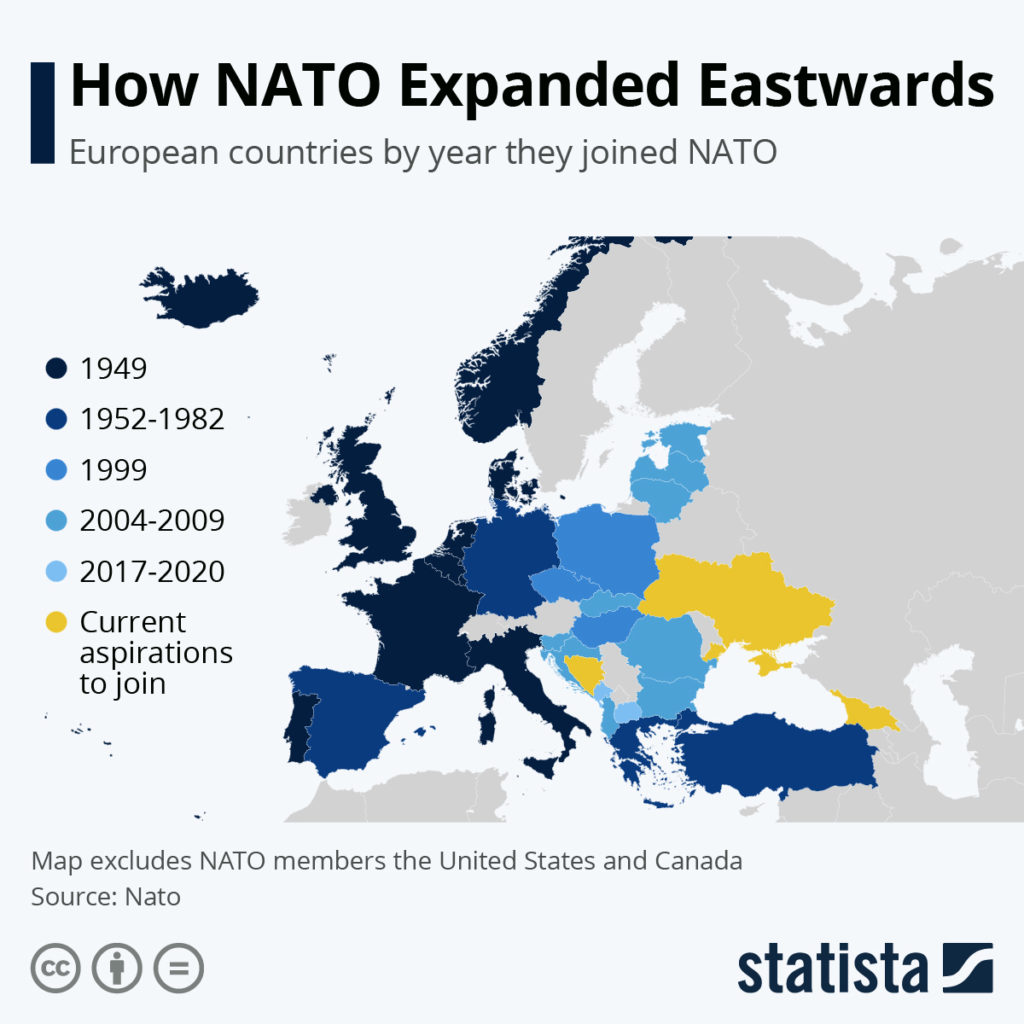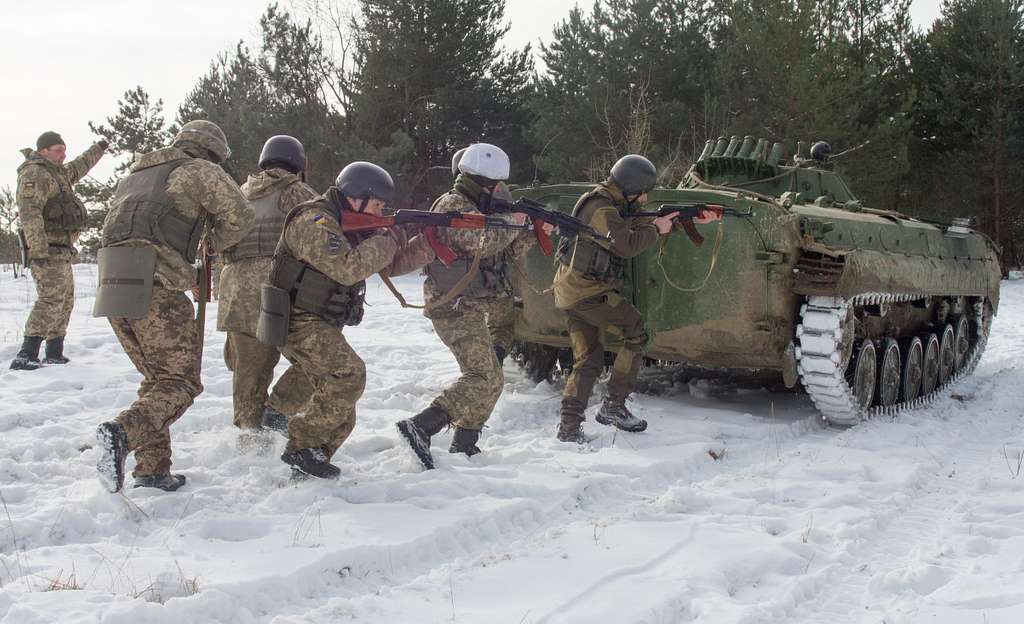With Russia’s attack on Ukraine underway, the corporate media is awash with openly hostile coverage of the conflict, embedded with an implicit premise that the Russian Aggressor has invented an empty pretext for the invasion of its neighbor. Concerns over NATO, it suggests, are merely cover for an expansionist dictator hellbent on conquering Europe.
Vladimir Putin’s ongoing incursion into Ukraine is excessive and unjustified. The deaths of innocent civilians are on his hands, and steps short of an assault were likely available to him. (A true peacekeeping mission to defend Russian-speaking minority separatists—who’ve invoked a legitimate desire to break away from a state that has declared war on them—was not attempted.)
Instead, an invasion and, possibly, an outright regime change operation to “de-Nazify” the Ukrainian government, are well in progress.
However, Moscow’s overreaction to the Donbass crisis does not negate its long-aired concerns over NATO’s growth east, as the bloc has gained more than a dozen new members since the dissolution of the USSR. Despite regular dismissal—and flat-out historical denial—by Western officials, much of the press and NATO itself, a neutral look at Russia’s concerns finds they are not unreasonable.
Vladimir Putin has asked the West to keep its word—its repeated assurances upon the fall of the Soviet Union that NATO would not creep “one inch eastward.” Those promises are well documented. But that seemingly fair request has been firmly rejected, with the Joe Biden administration slamming the door on any chance of reversing NATO’s course after the latest round of bilateral security talks earlier this year.
Ukrainian NATO membership has been an especially bold red line for the Russians, made known to the West time and again. While Moscow has tolerated the admission of its Baltic neighbors into the alliance, “Little Russia” must never become home to American military bases, strategic bombers or missile batteries—that is the view Putin himself detailed in a lengthy February 21 speech in which he recognized the Donbass region as independent.
Washington’s deep role in the 2014 ouster of Ukrainian President Viktor Yanukovych—spearheaded by neo-Nazi factions who don’t bother to hide blatant admiration for the SS—was also viewed as radically provocative. That was the second US-backed ‘color revolution’ in the country within one decade, following a long series of similar exercises in the Balkans and Eastern Europe.
While these concerns are regularly brushed off as simply the Kremlin line, whether one believes them to be valid—Russia does. They have been stated repeatedly over the years, not only in Putin’s public comments but in private diplomatic communications.
A common, and not entirely unreasonable, response to these arguments states that nations have the right to make their own policies and alliances; Russia cannot dictate anyone else’s future or hold veto over their ability to forge ties with new allies.
To the extent nations have rights, they certainly have the right to form alliances as they see fit. But the problem is with NATO itself. Its Article 5 provision can only mean massive escalation of conflict. One member’s fight is everybody’s fight, setting up a tripwire for regional or even global war. To date, it has taken part almost exclusively in wars of aggression, including those in Kosovo, Afghanistan and Libya.
The alliance is obsolete, its purpose served. The Soviet Union is dead and gone and the Warsaw Pact with it. Despite his recent actions in Ukraine, Vladimir Putin is not poised to take over Europe, and the refusal of Germany and other members to contribute the required proportional funding to NATO suggests there is little concern that he is.
Moreover, few of NATO’s 30 members could truly bolster the defense of the United States or any other ally in the event of a major attack. One of the sole purposes of the alliance, then, is to drag America into other nations’ battles, ensuring maximum escalation of hostilities. The US military is the most powerful in human history, capable of unleashing destruction upon entire civilizations, even without its ICBMs. Several times in living memory, it has.
Though hot conflict was a foreseeable consequence of the continued push to admit Ukraine into NATO, the excesses of the Russian incursion are rightfully condemned. Like the US military’s, Russia’s “precision strikes” are not always so precise. Civilian death is an outrage to humanity regardless of whose bombs are falling.
But that is not the view of the Western corporate press, whose selective outrage is invoked only for America’s ‘adversaries.’
As US missiles pounded Syria in 2017, media pundits like MSNBC’s Brian Williams gushed, making poetic references to America’s “beautiful“ weapons. Following the attack, CNN’s Fareed Zakaria said Donald Trump “just became president“—his first brazen act of violence sealing his place as rightful leader.
The missile strikes reportedly killed nine civilians, including four children, after straying into Syrian villages. The pundits were silent.
Saudi Arabia’s savage, seven-year bombing campaign on Yemen has devastated civilians and infrastructure, striking farms, schools, factories, hospitals, roads, bridges, ancient cultural sites, and even weddings and funerals. Just two years into the war, 65 percent of Yemen’s medical facilities were damaged or destroyed by airstrikes.
The United States has supported the Saudi war effort in almost every way possible: with Riyadh flying American-made planes maintained by American contractors (formerly refueled by American tankers), which drop American-made bombs on targets once selected with the aid of American intelligence. Saudi’s blockade of Yemen’s commercial ports has the backing of the US Navy, and US diplomats go to bat for the kingdom before international bodies like the UN, allowing them to investigate their own war crimes.
Few Americans are aware of this, or could find Yemen on a map, and it’s little wonder why. In 2017, the liberal-leaning bastion MSNBC went an entire year without mentioning the conflict a single time on air. In the same period, it ran the better part of 500 segments on porn star Stormy Daniels. The lion’s share of major outlets have done only slightly better.
One hardly needs to mention the uncritical, and often non-existent, press coverage of violent US interventions in Afghanistan, Iraq, Syria, Libya, Pakistan, Somalia and Mali, among others. There, civilian death is merely an unfortunate side effect of a noble effort, to be quietly lamented but rarely condemned.
In Western governments and media, double standards are now on full-blast, angrily denouncing Russia’s “unjustified violation of the territorial integrity of a sovereign nation” during wall-to-wall coverage. Meanwhile, Israel—America’s best friend and a land-grabbing ethno-state working to purge its Arab inhabitants—has bombed Syria four times this month, following hundreds of similar air raids over the last decade. The pundits have been silent.
If the US government or its subservient media expect to have the moral standing to condemn the acts of other nations, they must live up to their own lofty standards. Only then can they be taken as anything but cynical liars.
































